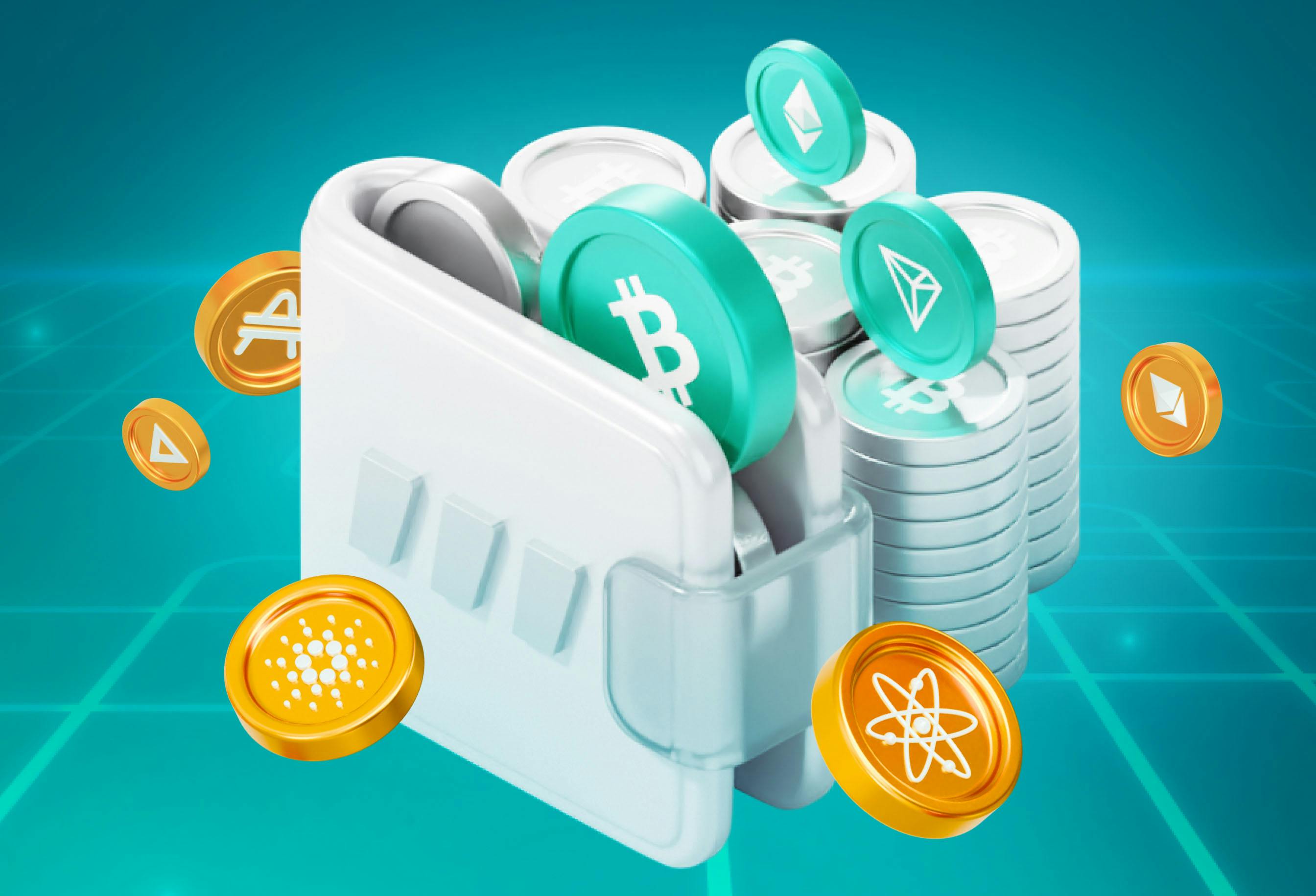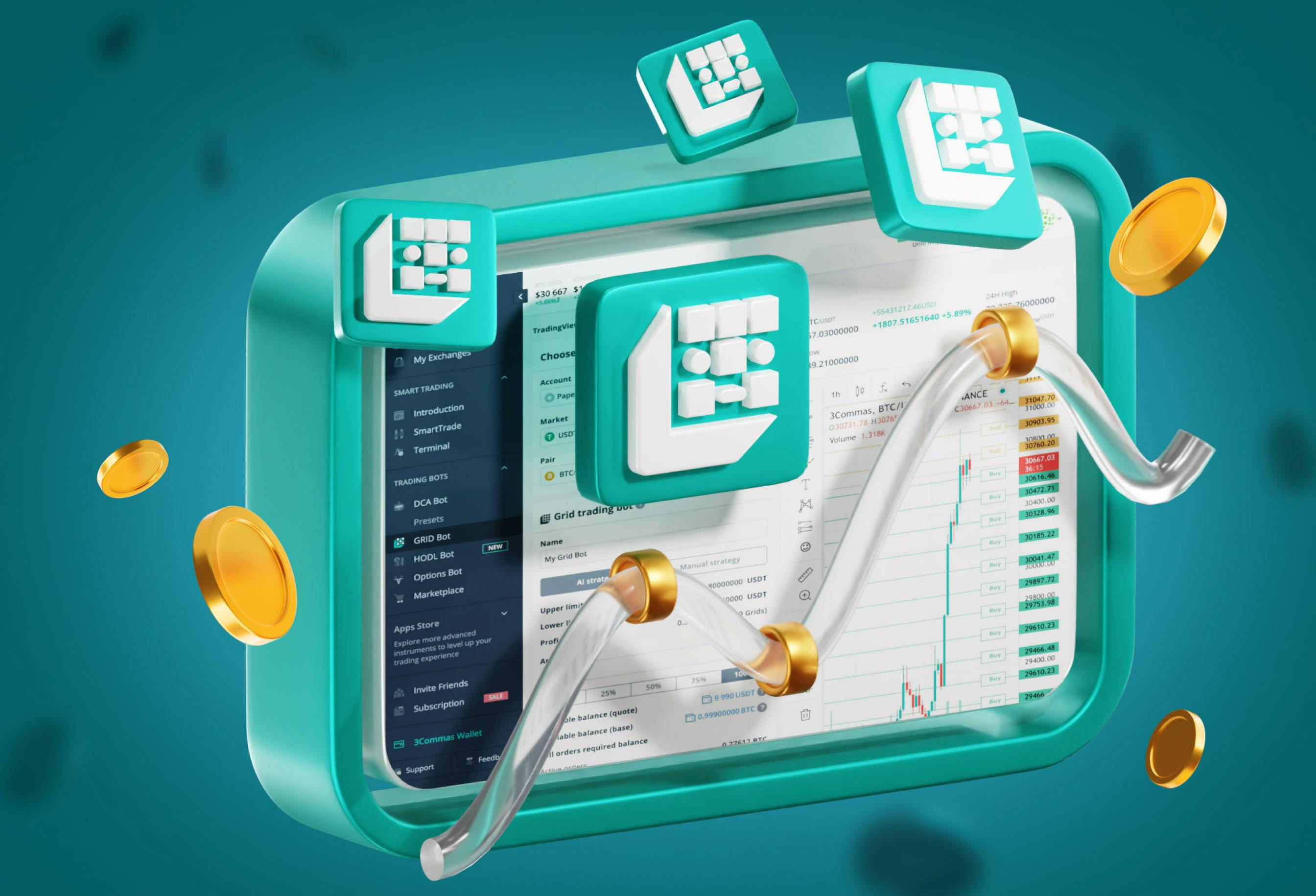
- All
- Tools
- Analytics
- Technical Analysis
- Trading
- Blockchain
- DeFi
- Guides
- Company News
- Educational
- Opinion
- Price Predictions
- Market News
- News
- Trading cases
- Practical guides
- Exchanges
- Trading signals
- Cryptocurrency
- Crypto bots
- Other
Become a crypto master
Learn everything about crypto,
trading and bots

Best Decentralized Cloud Storage Projects 2025: Top Eight On A Radar
Learn more about the decentralized storage concept, its influence on the industry, and the best decentralized storage crypto projects currently providing services.
- Best Decentralized Cloud Storage 2025: Key Takeaways
- Best Decentralized Cloud Storage: What is a Decentralized Storage Network?
- Best Decentralized Cloud Storage: What are The Benefits?
- The Best Decentralized Cloud Storage: TOP 8 Quick Overview
- Decentralized Storage Network Vendors: A Detailed Rundown
- Filecoin — Best Decentralized Cloud Storage
- BitTorrent — Blockchain Storage Projects
- Arweave — Blockchain Storage Projects
- Safe Network — Blockchain Storage Projects
- Sia — Blockchain Storage Projects
- Storj — Blockchain Storage Projects
- Utopia — Blockchain Storage Projects
- Ocean Protocol — Blockchain Storage Projects
- Other Storage Crypto Projects Listed
- Best Decentralized Cloud Storage: Next Steps
- Top 3 Blockchain Storage Projects Alternatives: Including Best Decentralized Cloud Storage and more
- Blockchain Storage Projects vs Secure Cloud Storage Projects
- Blockchain Storage Projects vs Container Storage Projects
- Blockchain Storage Projects vs Traditional Storage Projects
- Storage Crypto Projects for Enterprises
- Best Decentralized Cloud Storage at Lower Cost
- Decentralized cloud storage: What you need to know
- Conclusion
- What Crypto Traders Should Know About Decentralized Cloud Projects Set For Launch In 2025
Start Trading on 3Commas Today
Get full access to all 3Commas trading tools with free trial period

Decentralized storage has been gaining traction in recent years, and numerous options are already on the market. Most of these products rely on blockchain to support their storage strategies. This write-up describes the best decentralized cloud storage providers, so you can understand which one is the best pick.
Best Decentralized Cloud Storage 2025: Key Takeaways
- A key trend across best decentralized cloud storage & blockchain ledger storage distribution is the ability to access cloud storage directly from a web browser interface
- Blockchain P2P networks have provided internet users with a decentralized data storage offering to store sensitive data and allow secure file transfers.
- Decentralized data storage networks shard files and distribute them across storage nodes [user nodes] in multiple locations.
- Decentralized storage cost is reduced by perfectly balancing the demand side and supply side.
- Distributed storage services might be a secure communication in a way like a tool for reclaiming online freedom.
Best Decentralized Cloud Storage: What is a Decentralized Storage Network?
The decentralized file-sharing sector is growing in popularity by the day. Instead of keeping data on a single centralized server, where it might be hacked or controlled, decentralized file sharing provides censorship resistance as well as a robust method of online data storage. By providing token incentives to nodes, blockchain technology helps to improve existing decentralized file-sharing systems.
Data is encrypted and stored across numerous locations, or nodes, that are maintained by people or organizations willing to contribute their additional disk space for a charge. The data's owner only holds the private encryption key; storage providers do not have access to the data. The files are often sharded and distributed across different sites, adding another degree of storage protection.
Blockchain is frequently used to track storage transactions in decentralized data storage products. Blockchain is a distributed ledger system that automatically synchronizes and validates storage transactions across distant nodes. The blockchain ledger may record shard hashes, data locations, lease prices, and other transaction-specific information. Blockchain can also connect people needing storage with servers that provide it.
Best Decentralized Cloud Storage: What are The Benefits?
Best decentralized cloud storage solutions are more difficult to compromise than typical centralized systems. Files are deconstructed and distributed among various nodes in a decentralized network using a process known as segmentation. These files are encrypted with a private key, making it difficult for another node in the network to see an individual file; security. When nodes in a centralized system fail, data integrity is called into doubt. Terminating a few nodes in a decentralized system has no effect on the whole network.
Another important point why so many storage crypto projects evolve is the fact that decentralized data storage projects have their own coins, which allow network players to earn additional earnings; at a minimal cost. The cost of data storage on a decentralized basis is cheaper than that of centralized competitors like Microsoft Azure, AWS, and more.
The Best Decentralized Cloud Storage: TOP 8 Quick Overview
Product | Backing Asset | Tagline |
Filecoin — best decentralized cloud storage overall | Filecoin [FIL] | Verifiable storage with censorship resistance |
BitTorrent — best decentralized cloud storage for early-adopters | BitTorrent Token [BTT] | The first scalable decentralized storage ecosystem |
Arweave — best decentralized cloud storage for communities | Arweave [AR] | Immutable data access, community-owned data |
Safe Network — best decentralized cloud storage for retail users | Safecoin [MAID] | Decentralization solution for retail users |
Sia — best decentralized cloud storage for commercial usage | Siacoin [SC] | Commercial & developer data storage solution |
Storj — best decentralized cloud storage for anyone | Storj [STORJ] | Affordable and fast cloud storage for anyone |
Utopia — best decentralized cloud storage for systematic storage | Crypton [CRP] & Utopia USD [TOPIA] | P2P Ecosystem with built-in products |
Ocean Protocol — best decentralized cloud storage for DeFi startups | Ocean Token [OCEAN] | On-ramp and off-ramp for data assets into DeFi |
Decentralized Storage Network Vendors: A Detailed Rundown
The primary idea of Web 3.0 is open source and decentralization. Decentralized file storage is essential for Web 3.0 so that users and producers can finally take control of the web.
While blockchains are meant for decentralized storage, they are not intended for ample file storage. They're designed to handle transaction data, smart contracts, and source code. To put that in context, the Bitcoin and Ethereum ledgers are each less than 1 TB in size, but other projections have the internet storing 40 billion TB of data.
In the future, most value creation or value transfer on the internet will entail some form of content or file that requires a decentralized, permanent storage solution. The good news is that various solutions/projects are being implemented while keeping decentralized permanent storage in mind.
Filecoin — Best Decentralized Cloud Storage
Filecoin is a peer-to-peer [P2P] network that allows users to store files securely and has several built-in economic incentives. Users have to pay Storage Miners to keep their information. Thus, two types of participants can join the Filecoin network: those who want secure storage at competitive prices and those who want to earn by securely storing other users’ data.
Filecoin was based on another P2P file storage and retrieval protocol called the InterPlanetary File System (IPFS). This platform is very similar to Filecoin, but it does not have any financial incentive. Users can share data and storage space for free using the IPFS network. However, you can’t profit from utilizing this protocol. Thus, Filecoin enhanced the storage model with the incentive of FIL token mining.
Filecoin users pay miners to store, organize and distribute data. Miners are rewarded for their efforts in the form of FIL tokens. The open market determines the cost of associated fees. Two types of miners support the Filecoin network. Each of these miners is paid to provide storage space for the users.
The miners compete with each other by offering the lowest price for storage. The only criteria for becoming a miner is a free hard drive space and an Internet connection. If you become a miner, you will be evaluated based on your reliability and the value of the offered storage.
Filecoin is based on two consensus mechanisms: Proof-of-Replication and Proof-of-Spacetime. The Proof-of-Replication mechanism verifies that the miner has actually stored the number of copies of data it claims to have on its drive. The Proof-of-Spacetime mechanism is responsible for ensuring that the miner continues to store a unique piece of data for the network.
These systems allow Filecoin to autonomously detect faulty miners. Each miner’s history is stored in the protocol. Each miner is rated for reliability, price and availability. Reasonably, the miners with the highest reputation receive more storage requests. Consequently, they benefit from more rewards.
The value of a FIL token depends on two major factors:
- A number of people willing to provide secure storage through the Filecoin network
- A number of users willing to pay to store their files.
Beyond storing files, Filecoin has other decentralized data services, like a decentralized storage marketplace.
BitTorrent — Blockchain Storage Projects
To understand what the BitTorrent (BTT) blockchain storage project is and how it works, we must first understand the firm that founded it - BitTorrent Inc. It was founded in 2001 as one of the earliest torrent clients by the well-known American software developer Bram Cohen. BitTorrent is a peer-to-peer protocol that enables hundreds of millions of users to upload and download content. It is now the world's leading peer-to-peer network in terms of the user base, service quality, and general appeal.
BitTorrent works as follows: huge files are divided into pieces and delivered to the recipient across the network, where they are later restored to the recipient's device. Every user who downloads a file becomes an immediate member of the ecosystem.
On the BitTorrent platform, users can take on the roles of Seeds and Peers. The first is the individual who shares the entire file, whereas the peer receives the requested file in pieces. They remain a seed once the file is on the user's Internet-connected device.
Justin Sun, the founder of Tron Foundation (TRX), paid $127 million for BitTorrent Inc. in July 2018. Analysts and market professionals believe that it is a highly profitable endeavor. Although Sun gave him a chance, BitTorrent inventor Bram Cohen declined to continue engaging in the project.
On the Tron network, BTT is a TRC-10 standard token. It was designed to improve the BitTorrent protocol and integrate it with the blockchain. Seeds are no longer merely sharing files; they are also compensated in the form of BTT for doing so.
They are not forced to purchase costly equipment (as miners are) or to participate in staking. Users get compensated merely for storing a file on their machine. You may earn bitcoin by downloading a copy of your favorite artist's book, movie, or whole album on your laptop and sharing it with others. That is why BitTorrent is such an appealing initiative in this space.
Arweave — Blockchain Storage Projects
The Arweave (AR) ecosystem is one of the best decentralized cloud storage providers out there. Its features can be divided into four main components:
- Blockweave technology. A cloud archive, which functions on the basis of the Proof-of-Access algorithm. Blockweave allows you to store a huge amount of data at the lowest possible cost due to its structure
- Proof-of-Access. This algorithm allows the generation of new blocks with only information about the current block and any other block provided to the miner by the system
- Wildfire. This is a system that ranks each node locally. It determines how quickly new blocks and transactions are distributed among the nodes;
- Blockshadows technology. Blockshadows may theoretically provide a throughput of 5,000 transactions per second.
The AR token sale attracted an impressive number of investors with large venture capital funds, such as Andreessen Horowitz (a16z), Union Square Ventures (USV), and Multicoin Capital.
While some other decentralized data storage solutions prioritize privacy or evade censorship and surveillance, Arweave is built for data longevity. Arweave is a blockchain-like peer-to-peer (P2P) storage mechanism that provides additional storage capacity on PCs operating as Arweave clients. Permaweb is a program that allows data storage and other capabilities.
The permaweb is an immutable ecosystem for storing static files and other sorts of data, such as websites. Those who want to save data must pay a one-time charge in the form of AR tokens accessible from major crypto exchanges.
Arweave is 100% community-operated and is designed to work only with Linux.
Safe Network — Blockchain Storage Projects
MaidSafeCoin (MAID) is a coin intended for the SAFE network to utilize unused hard drive space for its customers. Users can share disk space, memory, and computing power.
Maidsafe.net built the SAFE network, one of the Best decentralized cloud storage, peer-to-peer, and communication network. The network allows for fully protected data storage as well as file exchange. Clients can utilize the network anonymously and benefit from its resilience to censorship. The solution makes use of a scalable token to assure minimal transaction fees.
MAID tokens are not mineable. However, they may be farmed. The Proof-of-Resource algorithm is used in the network. The system has two key participants: "farmers" and "clients": Clients can see and save data and transfer cash. Farmers collect and arrange data.
The program links farmers to the SAFE network and saves data to their computers. There are multiple layers to the data vault. The farmer begins at the first level and analyzes the data with a random group of farmers; the node's age grows as it progresses from group to group. Thus farmers can get the Elder Vault role, which gives them the right to vote on the group’s actions towards the stored data.
Sia — Blockchain Storage Projects
Sia, like Filecoin, employs blockchain technology to create a decentralized data storage platform that encrypts and distributes files across a worldwide peer-to-peer network. The Sia client program, which is available for Windows, Linux, and macOS, divides each file into 30 pieces and distributes them to several hosts.
The program employs Reed-Solomon erasure coding to provide redundancy and the recovery of a file from only ten of its segments. The program additionally encrypts the segments before delivering them to the storage servers using the free source Threefish method. Renters purchase storage using Siacoin, and hosts store data with Siacoin as collateral.
Sia software is open source, including an API that developers may use to create apps. Setting up Sia – as a renter or host – is a simple, well-documented procedure that distinguishes it from rivals.
Sia is a decentralized storage marketplace where storage providers compete for customers' business. Pricing is less predictable as a result. Sia estimates that 1 TB of storage should cost less than $2 per month (paid in Siacoin). However, renters should be mindful of other charges such as contract creation fees and bandwidth fees for uploading and downloading data.
Storj — Blockchain Storage Projects
Storj (STORJ) is yet another Ethereum-based cloud storage platform. Every member of the Tardigrade network can give free storage space on their local media. All you need to join the Storj ecosystem is free storage space and several terabytes of bandwidth to share data.
Storj, like other comparable services, has a number of advantages over typical cloud storage alternatives. Because data is encrypted and sharded at the source, unauthorized third parties have almost no access to the information. Storage is spread organically, which enhances availability and download speeds by utilizing numerous concurrent connections.
Utopia — Blockchain Storage Projects
The Utopia peer-to-peer network is intended to restore internet freedom and anonymity. It ensures secure communications while preventing government and third-party snooping. Curve25519 high-speed elliptic curve encryption is used for online communications, whereas 256-bit AES is used for local storage.
Utopia accepts two cryptocurrencies: Crypton and Utopia USD. Utopia's primary currency, Crypton, is supposed to be decentralized and untraceable, although Utopia USD is more stable due to its peg to the US dollar.
Users of Utopia save their data in encrypted containers. Utopia defines an encrypted container as "encrypted, password-protected storage of your Utopia data, such as your private key, uMails, uWallet, files, chat history, contacts, and transaction history." Utopia is compatible with all major operating systems.
The decentralized storage option fits both developers [cloud storage for developers] and retail users, as the platform has a fairly easy onboarding process and intuitive layout.
Ocean Protocol — Blockchain Storage Projects
The Ocean Protocol (OCEAN) project is working on creating a decentralized platform for sharing data, especially info created by AI. It utilizes blockchain technology, tokens, and smart contracts to connect data consumers with information providers. This allows data to be exchanged in a trustless way with guaranteed transparency and traceability for all participants.
Users can control their data flow without being tied to any particular trading floor. The project combines blockchain technology with a data exchange platform to create a complete ecosystem. Users and businesses will be able to participate in a new data economy that spreads across the world, affecting every business, every individual, and every device.
There is a wide range of participants in the Ocean community, from AI developers to businesses and nonprofit corporations to crypto-enthusiasts and other users, who believe in the future offered by the Ocean Protocol. As the blockchain moves on to v4 and v5, it will be fully decentralized in its funding as management becomes fully decentralized.
Other Storage Crypto Projects Listed
There are many storage crypto projects already operating and developing. Let’s list some lesser-known storage crypto projects to understand what you can expect from the industry.
Holo — Decentralized Storage Projects
One of the lesser known storage crypto projects working like AirBNB among vendors of decentralized storage. Storing files with Holo works for corporate clients and retailers alike — each user can use Holo client software or a host capacity to store data within the network.
Phantasma [SOUL] — Decentralized Storage Projects
Phantasma is one of the storage crypto projects focusing on the gaming vertical. The network is aimed at serving as a backbone for the decentralized gaming industry.
Aleph.im [ALEPH] — Decentralized Storage Projects
One of the storage crypto projects to allow on-chain and off-chain data integrations — you can access your off-chain securely to save on storing all data on-chain.
ScPrime [SCP] — Decentralized Storage Projects
P2P distributed datacenter to outpace all other storage crypto projects using the community power. It’s not quite popular, but the project has been growing pretty well recently.
Bluzelle [BLZ] — Decentralized Storage Projects
Yet another of the gaming-focused storage crypto projects to allow quality games, data storage, and finance solutions across the board.
Storage crypto projects also worth mentioning:
- Pac Protocol [PAC] — Decentralized Storage Projects
- Stratos [STOS] — Decentralized Storage Projects
- Opacity [OPCT] — Decentralized Storage Projects
- Crust Network [CRU] — Decentralized Storage Projects
- ProximaX [XPX] — Decentralized Storage Projects
- SONM [SNM] — Decentralized Storage Projects
- Big Data Protocol [BDP] — Decentralized Storage Projects
Best Decentralized Cloud Storage: Next Steps
Larger corporate suppliers have either kept blockchain technology at a safe distance or have completely abandoned these goods. Around 2018, cloud hyperscalers and traditional enterprise suppliers announced new solutions or collaborations to deliver blockchains and distributed ledgers in an effort to enter the distributed infrastructure game.
Along with AWS and GCP, IBM, SAP, and Oracle maintain blockchain offerings ranging from managed services to IT starter kits for building off the open source Hyperledger Fabric architecture, a permissioned blockchain infrastructure for developing blockchain-based software and applications.
Most services are still available, while Microsoft Azure's Azure Blockchain Service will be phased off in September 2021. However, none of these corporate apps are focused on distributed storage or a blockchain storage solution.
Some believe that corporations hopped on the blockchain bandwagon due to FOMO, and that people left because they never adopted blockchain in the first place.
Meanwhile, many corporations believe distributed ledgers have a future. Financial institutions are embracing Hyperledger Fabric, seeing the benefits in an immutable chain of ownership and data changes. The acceptance of bitcoin and the development of current blockchains will most likely entice businesses to join a Web3 future.
Top 3 Blockchain Storage Projects Alternatives: Including Best Decentralized Cloud Storage and more
Microsoft Teams is still the main collaborative tool for employees, but there's a storage aspect to this software that organizations must deal with. Especially with many employees working remotely and the related data storage planning issues.
Teams use Microsoft 365 SaaS applications to store their data, for example, SharePoint Online for file storage and Exchange Online for contacts. More users, more data, more issues. Newer storage technologies, such as containers and decentralized systems, have grown in prevalence to solve the problem.
Blockchain Storage Projects vs Secure Cloud Storage Projects
Once data moves to the cloud, it usually stays there for a long time. That may cause issues, as cloud security has improved, but it can still be quite risky for a business. Alternative data storage practices may help improve cloud safety, including encryption and strict access controls. Besides, there are plenty of non-cloud solutions to consider.
Blockchain Storage Projects vs Container Storage Projects
Containers have all the resources to run a software application. Portability is the best you can get out of them. Such storage runs inside a container cluster and can run anywhere in the public cloud or beyond. It's similar to hyper-converged infrastructure in combining storage, servers, and virtualization into one platform.
Blockchain Storage Projects vs Traditional Storage Projects
Decentralized storage is a new idea that is quickly gaining popularity. Decentralization fragments encrypted data and stores it in many locations, hence the term. There are several startups in this space, as there are in container-native storage. It's also a relatively new approach, so learn about decentralized data storage best practices to remain ahead of the competition. Choose your service provider cautiously. Filecoin, Sia, and Storj are three of the leading names, but this is a growing sector, so keep an eye out for new names.
Storage Crypto Projects for Enterprises
Decentralized storage systems from a variety of suppliers have recently manifested and evolved, providing business clients with new alternatives in a congested industry. These services can range from firms selling storage and apps geared firmly at competing with huge cloud storage providers like AWS and Azure to smaller, personal services aimed at storing up just 1 to 2 TB overall.
However, the financial incentives for individuals to share their storage with other users throughout the distributed network, known as nodes, are well aligned with contemporary distributed storage models. At the moment, that incentive model uses blockchain technology to generate transaction ledgers and cryptocurrencies that compensate node operators for uptime and security.
Best Decentralized Cloud Storage at Lower Cost
Filebase is one such service, delivering S3-compatible storage on blockchain-based networks Skynet, Sia, and Storj. The company functions as a middleman service for these dispersed networks and their several different coins by enabling an individual or organization access without further setup or logistics. Payment is only available through a monthly pay-as-you-grow subscription option.
Decentralized cloud storage: What you need to know
Three fundamental obstacles lie in the way of the broad adoption of decentralized cloud storage.
- Decentralized cloud storage disperses data among several cloud storage devices located in various locations.
- Some organizations are hesitant to employ the technology due to the potential for difficulties. They claim that data loss might occur if storage devices fail.
- The major cloud providers do not yet offer decentralized data storage products. As a result, the best decentralized cloud storage is provided by minor vendors.
As a result, those looking for decentralized cloud storage solutions are buying from small decentralized storage vendors like Storj. In turn, other decentralized data storage offerings might appeal to users who do not fully trust the larger providers regarding their data privacy.
Conclusion
The big question is whether decentralized data storage will replace traditional solutions. Will this form of open-source storage be a serious competitor to centralized solutions by Amazon, Dropbox, and others? One disadvantage of many startups in this field lies in the “remoteness” of their solutions from the perception of an average user, a flaw seen in many crypto projects and DApps. Customers may be tempted to start using such a decentralized storage service only if it is as intuitive as (and cheaper than) the competitors’ solution.
However, decentralized storage technology still has a future. People with extra hard drive space can be rewarded in cryptocurrency for storing someone else’s files without compromising privacy. Given how many web pages and files that existed in the early days of the Internet are now lost, decentralized storage can help prevent our digital legacy from disappearing without a trace.
In conclusion, the landscape of decentralized cloud storage has evolved significantly since our initial discussion in 2025. As the demand for secure, censorship-resistant, and cost-effective data storage solutions continues to grow, several innovative projects have risen to the occasion. These projects leverage blockchain technology and peer-to-peer networks to offer a decentralized alternative to traditional cloud storage providers. In this updated article, we have explored some of the top players in this field and their unique features, as well as delved into the broader implications of decentralized storage.
One of the key takeaways from our discussion is the shift towards accessing cloud storage directly from web browsers, making it more convenient for users. This user-friendly approach is a testament to the evolution of decentralized storage solutions, as they strive to compete with established centralized providers.
Blockchain-powered peer-to-peer networks have played a pivotal role in revolutionizing data storage. By allowing users to store their data across a distributed network of nodes, these systems ensure data security and availability, even in the face of node failures. The encryption of files and their distribution across multiple locations further enhances the security and privacy of decentralized storage.
Cost-effectiveness is another driving force behind the adoption of decentralized cloud storage. Many of these projects have their own native tokens, allowing users to earn rewards by participating in the network. This incentive model has helped reduce the cost of data storage, making it more affordable than traditional cloud providers like Microsoft Azure and AWS.
In our exploration of the top eight decentralized cloud storage projects, we found a diverse range of options catering to various user needs. Filecoin stands out as an overall leader, offering verifiable storage with censorship resistance. BitTorrent, with its scalable decentralized storage ecosystem, appeals to early adopters. Arweave focuses on community-owned data and data longevity. Safe Network provides a decentralized solution for retail users, while Sia targets commercial and developer data storage needs. Storj offers affordable and fast cloud storage for a wide range of users. Utopia prioritizes secure communication and anonymity. Ocean Protocol is geared towards DeFi startups, facilitating data asset on-ramp and off-ramp.
Beyond these top contenders, there is a thriving ecosystem of lesser-known storage crypto projects, each with its own unique features and target audiences. Holo, Phantasma, Aleph.im, ScPrime, Bluzelle, and others are contributing to the expansion of decentralized storage options, catering to diverse use cases.
Looking ahead, the future of decentralized storage remains promising. While challenges like data dispersion and user adoption persist, the potential benefits in terms of security, affordability, and user empowerment are too significant to ignore. As more individuals and organizations recognize the advantages of decentralized storage, it may become a formidable competitor to centralized solutions offered by industry giants like Amazon and Dropbox.
Ultimately, the success of decentralized storage projects will depend on their ability to bridge the gap between their innovative technology and user-friendly interfaces. If these projects can provide intuitive and cost-effective solutions, they stand a good chance of gaining traction and preserving our digital legacy for generations to come. As the decentralized storage landscape continues to evolve, it's an exciting space to watch, and it has the potential to reshape how we think about data storage in the digital age.
What Crypto Traders Should Know About Decentralized Cloud Projects Set For Launch In 2025
For most professional crypto traders and institutional investors, a secure and robust data infrastructure is key. In 2025, decentralized cloud storage projects are advancing beyond basic data redundancy. They will enable paradigm shift storage systems for off-exchange sensitive trading strategies, on-chain analytics, and user data. Below are several noteworthy projects which are gaining traction.
1. Functionland (FULA)
Functionland is developing the FxBlox hardware, an open-source device that integrates with the Fula network to provide decentralized data storage solutions. By utilizing personal devices instead of central servers, Functionland ensures a highly secure and decentralized network. The Fula storage network is scalable; users can expand storage capacity by connecting additional hard drives to their devices. FxBlox operates on low-power hardware, consuming minimal electricity and producing little heat, making it environmentally friendly. The platform supports cross-platform and cross-device compatibility, running seamlessly on Windows and Linux devices.
2. Hivenet
Hivenet is a Swiss-based technology company specializing in distributed cloud storage and computing services. Founded in 2022 by David Gurle, Hivenet utilizes unused digital space on various devices, transforming it into a secure storage network spread across the globe. This approach reduces reliance on centralized data centers, offering a sustainable alternative. Hivenet's platform employs encryption and fragmentation techniques to ensure data security and integrity, making it suitable for institutions aiming to improve control and reduce costs associated with sensitive datasets.
3. Codex Storage
Codex is a decentralized storage protocol designed to safeguard valuable information with durability and censorship resistance. It leverages erasure coding and zero-knowledge proofs to achieve tunable durability guarantees while being modest on hardware and energy requirements. Codex's decentralized structure is designed to endure, providing immutable access to historical datasets and regulatory backups, making it suitable for compliance-demanding industries.
4. Arcana Network
Arcana Network is a UX-focused appchain dedicated to improving Web3 user experience with a suite of products for developers and users. Its offerings include Arcana Auth for seamless user logins and Web3 authentication on decentralized applications (dApps), Arcana Gasless for frictionless Web3 transactions, and SendIt for simplified crypto transfers. By addressing challenges like user onboarding and transaction costs, Arcana fosters a more user-friendly and inclusive Web3 ecosystem.
5. Aleph.im
Aleph.im is a distributed cloud platform providing serverless trusted computing services, file storage, and database hosting. It enables AI-driven applications to access trusted off-chain data and run computations seamlessly. Aleph.im's blockchain-based infrastructure bridges hardware, cloud, and intelligence, offering a decentralized alternative to traditional cloud backends. This ensures faster access to structured data without compromising decentralization, benefiting traders relying on decentralized applications, DeFi dashboards, or trading automation.
These projects exemplify a new approach to cloud data storage, demonstrating increased autonomy in data management—a crucial factor for participants in the highly regulated infrastructures of crypto markets.
FAQ
Filecoin and BitTorrent are among the best decentralized cloud storage solutions. Storj, Arweave, and Safe Network are worthy mentions for retail users, while SIA targets commercial and enterprise decentralized cloud storage verticals.
Decentralized storage and the blockchain technology backing it up aren’t entirely new, yet storage innovations may solve many challenges for centralized storage companies.
Storj decentralized storage leans more towards developers and only supports data storage, while Filecoin both stores and distributes raw data.
Storj data storage is a combination of solutions, with a slight dominance of decentralized solutions over centralized ones. Other providers like Filecoin rely completely on decentralized storage.
Data storage networks play a big role across niches, as most businesses use storage services to keep the data of their customers. While traditional cloud storage is a popular solution, it’s not quite effective. Some businesses already switch to other storage options like decentralized data storage platforms, encrypted containers, and alternative data storage offerings.

A proven leader, successful at establishing operational excellence and building high-performance teams with a sharp focus on value creation and customer success.
READ MORE
- Best Decentralized Cloud Storage 2025: Key Takeaways
- Best Decentralized Cloud Storage: What is a Decentralized Storage Network?
- Best Decentralized Cloud Storage: What are The Benefits?
- The Best Decentralized Cloud Storage: TOP 8 Quick Overview
- Decentralized Storage Network Vendors: A Detailed Rundown
- Filecoin — Best Decentralized Cloud Storage
- BitTorrent — Blockchain Storage Projects
- Arweave — Blockchain Storage Projects
- Safe Network — Blockchain Storage Projects
- Sia — Blockchain Storage Projects
- Storj — Blockchain Storage Projects
- Utopia — Blockchain Storage Projects
- Ocean Protocol — Blockchain Storage Projects
- Other Storage Crypto Projects Listed
- Best Decentralized Cloud Storage: Next Steps
- Top 3 Blockchain Storage Projects Alternatives: Including Best Decentralized Cloud Storage and more
- Blockchain Storage Projects vs Secure Cloud Storage Projects
- Blockchain Storage Projects vs Container Storage Projects
- Blockchain Storage Projects vs Traditional Storage Projects
- Storage Crypto Projects for Enterprises
- Best Decentralized Cloud Storage at Lower Cost
- Decentralized cloud storage: What you need to know
- Conclusion
- What Crypto Traders Should Know About Decentralized Cloud Projects Set For Launch In 2025





